#iocdf
Explore tagged Tumblr posts
Text
International OCD Foundation
For our friends living with OCD, this website has a lot of helpful articles/information.
Link: https://iocdf.org/
2 notes
·
View notes
Text
Hello Tumblr! It's been a while!
I used to blog on here many a year ago and I am back - not to blog exactly, but to connect, network, share, explore and discover.
My name is Marady aka Max and I'm a queer 30-something Canadian blogger, content creator and mental health advocate.
I'm passionate about spreading awareness about mental health and supporting the 2SLGBTQIA+ community.
I've been busy preparing to launch a social media campaign to raise awareness about Obsessive-Compulsive Disorder (OCD), which I've been living with for over 20 years.
I'm excited to share that the International OCD Foundation (IOCDF) is in support of this campaign and so is a prominent mental health advocate!
I'm so stoked to share this project with you all when we launch on May 17th!
Feel free to reach out to me if you're interested in connecting or learning more about the campaign! 🥰

#2slgbtqia+#lgbtq#lgbtqia#mental health#mental wellness#lgbtq+#safe space#queer#ontario#queer community#ocd#obsessive-compulsive disorder#canadian#canada#social media#social media campaign#blogger#blog#advocate#advocacy#activist#activism#upcoming#content creator#international ocd foundation#iocdf
1 note
·
View note
Text
5 THINGS WE SHOULD BE LEAVING IN 2023. OCD EDITION
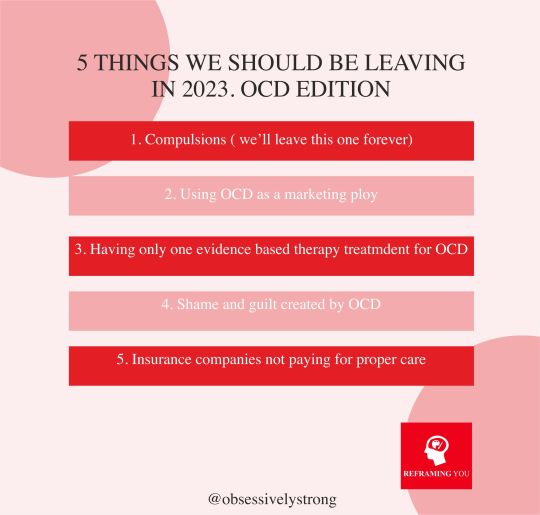
Our Speaker Madison says: What I would hope for 2024 is that we could leave these awful things in the past.
With a new year, it gives us space to remember why we’re fighting for OCD recovery, why were advocates, and why we have such an amazing community of people ready to help these individuals struggling.
However, these things on the list tend to get in the way of people being able to get the help that they so desperately need.
So here’s a list of a few things although there’s many more that I think we should leave in 2023.
I hope 2024 is the year of OCD recovery for us all!!
#ocd#ocdadvocate#ocdtherapist#iocdf#mentalcompulsions#obsessivecompulsivedisorder#icbt#erp#act#pureo#pureocd#intrusivethoughts#ocdsupport#ocdcommunity
0 notes
Text


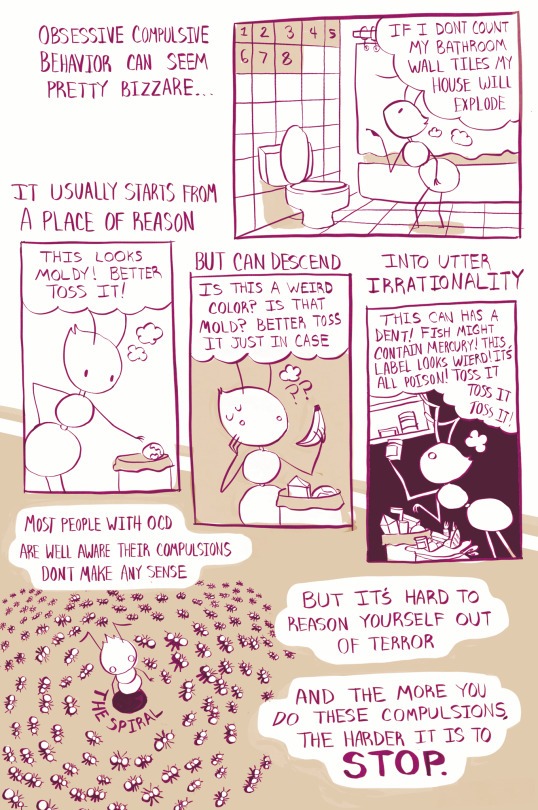
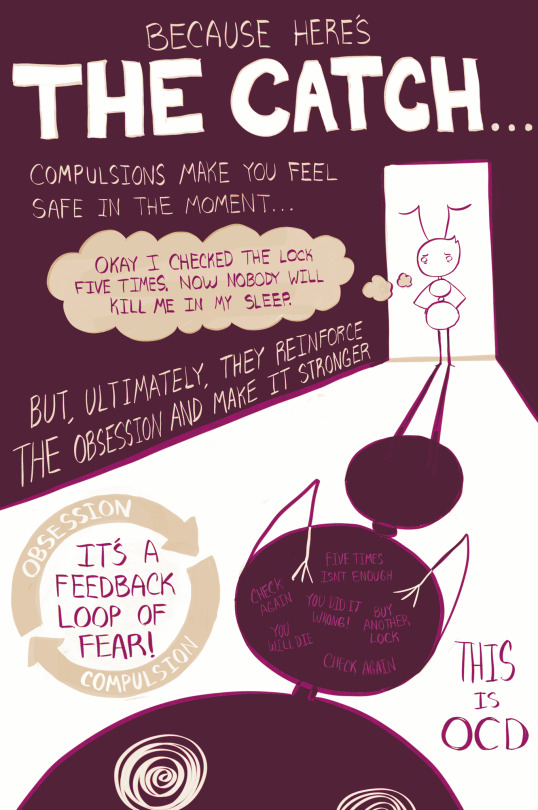

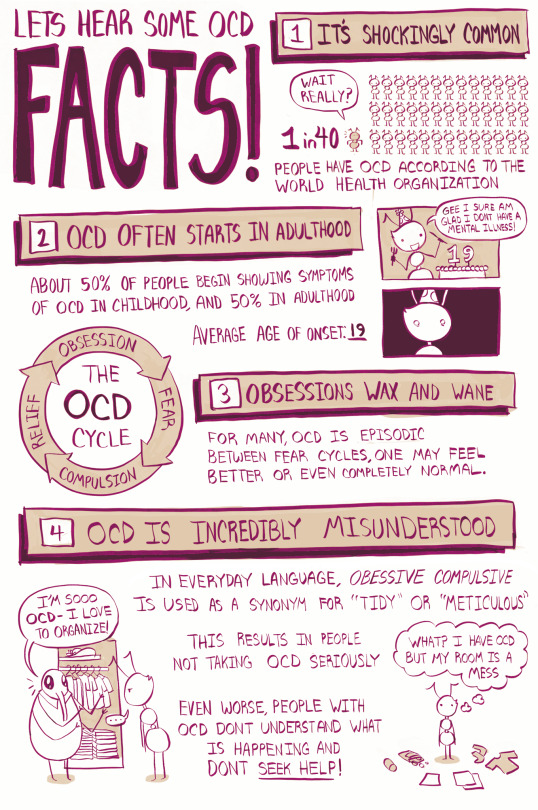



Greetings bugs and worms!
This comic is a little different than what I usually do but I worked real hard on it—Maybe I'll make more infographic stuff in the future this ended up being fun. Hope you learned something new :)
If you are still curious and want to learn more about OCD, you can visit the International OCD Foundation's website. I also recommend this amazing TED ED video "Starving The Monster", which was my first introduction to the disorder and this video by John Green about his own experience with OCD.
The IOCDF's website can also help you find support groups, therapy, and has lots of online guides and resources as well if you or a loved one is struggling with the disorder. It is very comprehensive!
Reblog to teach your followers about OCD
(But also not reblogging doesn't make you evil, silly goose)
#actually ocd#ocd#ocd tag#obsessive compulsive disorder#mental illness#mental health#neurodivergent#infographic#informative#comic#webcomic
78K notes
·
View notes
Text
I guess I kind of just use this account for PSAs now, and this has been on my mind a lot lately.
I figured out that I have OCD a few years ago, and recently I’ve seen a lot of bad advice around dealing with intrusive thoughts and obsessions.
There’s that post that goes around occasionally about “taking pictures of your oven knobs before you leave” or other things I’ve seen that say to “make a weird face when you lock your door.” THESE ARE COMPULSIONS. If you have/suspect you have OCD or you often struggle with things like that, please do not follow this advice. Instead, try to accept your intrusive thoughts and move on, not argue with them. Over time, they will get easier and easier to deal with. Ruminating, stressing, or arguing with them just makes them worse in the long run.
If you think you might have OCD and want to seek a specialist, the IOCDF’s home page has a lot of resources under the “find help” tab, including a locator.
I’m going to put the rest under a read-more because I’m going to talk a bit more in depth about intrusive thoughts and compulsions. This mostly because good OCD info is so sparse on line, and I’ve spent many hours compulsively researching OCD lmao.
Content warning:
discussion of unreality/doubting one’s own perception
discussion of specific compulsions
I’m not going to push this point too hard or shame anyone who doesn’t want to follow it, because OCD doesn’t really just go away. It’s a constant struggle. I give in to compulsions regularly, even though I am medicated and have seen a specialist to learn actual coping skills. It’s hard to resist sometimes and you don’t always have the energy, the awareness, or the power to ignore them. You do what you have to do to get through your day. The main difference is that the right medication and the right therapist make it easier to stay out of the spiral and to leave a spiral when you’re in one. They still happen. You still kind of have to play everything by ear.
Similarly, it is super fucking hard to get help or even get diagnosed. No regular therapist actually knows what the fuck it looks like, and specialists are few and far between and often don’t take insurance. It’s not fair or easy or necessarily productive to try and do exposure response prevention on yourself. Your “good coping skills” can even turn into an obsession or compulsion, where you’re constantly worried about what is an intrusive thought and what is not, or if you’re responding to them properly.
What I want to do is try to give at least some useful advice to people who are struggling with intrusive thoughts.
The best way to respond to them is not at all. This is especially true with OCD, because the response to them is sort of the root of this disorder. Sometimes, it’s recommended that with depression or anxiety you challenge your thoughts. In OCD, it’s the opposite. Challenging them can so easily lead you down a compulsion spiral. (More about that cycle from a professional.)
Compulsions can be entirely mental, but I’ll use a common behavioral one to look at how engaging with compulsions can go:
You start by taking a picture of the your stove knobs to make sure they’re all off. That works for a few hours or days, but then you start wondering if the knob is ever-so-slightly in the “on” position. You wonder if the picture proves they’re off enough. You forget to take the picture at all, and have to go back in to check anyways. You check your phone a few times before leaving to ensure that the picture is still there. You take several pictures because you can’t tell if you actually took any at all. You start to wonder if you can even trust what you see before your very eyes. What if you’re just imagining that the knobs are set to off? What if you’re just imagining the whole picture to begin with? The picture allows you to engage with your checking compulsion throughout the day, strengthening the connection between the intrusive thought and the urgency to do something about it. That means it gets worse. That means you find new ways to doubt your perception or your memory or whatever.
It can eventually get really bad. It’s hard and awful to try and deal with this on your own, but sometimes you have to.
It’s so shit. It’s so fucking shit how long many people suffer with mental illness without even knowing what’s going on. I didn’t know that my constant, overwhelming guilt over almost everything I’d ever thought or said or done or maybe did and couldn’t remember was the result of a disorder. It was so freeing to realize there was actually something that might help me, and I could learn to just live with myself and my weird ass thoughts that don’t necessarily mean anything at all. It’s so shit that OCD-awareness is so low among therapists. I was never going to get diagnosed until I found an OCD SPECIALIST (bold, italicized, all caps. Don’t trust people on psychology today who just put OCD in the list of what they treat.) and went over the Y-BOCS with her. It’s all so shit that several therapists I came to with textbook examples of OCD either ignored me or didn’t have the tools to help. I told one of them I “didn’t feel connected to reality” and he kind just went 🤷.
I just want everyone who is in that/a similar situation to at least have this information available to them.
If you want to learn more, these blogs from Sheppard Pratt were the best discussion of OCD I found online that really described what I was going through. They’re written by licensed therapists, several (all?) of whom live with OCD. They’re very healing to read if this is something you’re struggling with, or something you think you might be struggling with, and great in general if you want to learn more about OCD.
Whatever’s going on, OCD or not, have some grace with yourself. Take a few minutes today and do something kind for yourself, even just think one nice thing about yourself. You’re doing the best you can.
#actually ocd#ocd#ocd awareness#do with this what you will but I stresses me the hell out when I see people#uncritically reblog posts suggesting new compulsions to people#because they worked on me and made my ocd worse#im sure a lot of those suggestions came from others with ocd so I’m not trying to come after anyone about this#I just feel like I don’t see a lot of discussion about this stuff in general and even in the notes on those posts
458 notes
·
View notes
Text

unironically i started doing this yesterday and it actually works for me. unreal. from a listicle from iocdf about succeeding in your ocd treatment
2 notes
·
View notes
Text
How to Cure OCD: 7 Effective Strategies to Manage Symptoms Naturally
Introduction:
Obsessive-Compulsive Disorder (OCD) is a complex mental health condition that affects millions of people worldwide. For those wondering how to cure OCD or at least manage its symptoms effectively, there are various non-medical strategies that can make a meaningful difference. Although there is no absolute cure, managing OCD symptoms can allow individuals to lead fulfilling and balanced lives. Here, we explore seven practical methods to support individuals on their journey to manage OCD without medication.
Understanding OCD and Its Impact
Living with OCD can feel overwhelming, with individuals often caught in a cycle of intrusive thoughts and compulsive actions. These symptoms can interfere with work, relationships, and overall well-being. However, with the right strategies and support, many people with OCD learn to manage their symptoms effectively and regain control of their lives.
For those seeking the best OCD treatment, consider visiting:
Delhi Mind Clinic
Dr. Sugandha Gupta
Dr. Paramjeet Singh
1. Cognitive Behavioral Therapy (CBT) as a Key Method for How to Cure OCD
One of the most effective therapies for how to cure OCD is Cognitive Behavioral Therapy (CBT). This form of therapy helps individuals identify and challenge the intrusive thoughts that drive their compulsions. CBT uses techniques like Exposure and Response Prevention (ERP), which gradually exposes individuals to OCD triggers and helps them resist compulsive behaviors.
For those seeking more information on how to cure OCD with CBT, you can refer to trusted resources like the National Institute of Mental Health (NIMH), which provides detailed information on evidence-based approaches to managing OCD.
2. Practicing Mindfulness and Meditation for Managing OCD
Mindfulness is another powerful strategy for those looking to manage their OCD symptoms. Learning how to cure OCD involves building awareness of your thoughts and feelings without letting them control your actions. Mindfulness and meditation techniques—such as deep breathing and progressive muscle relaxation—can help individuals stay grounded and prevent obsessive thinking from spiraling into compulsive actions.
Although mindfulness won’t completely eliminate OCD symptoms, it can make triggers less overwhelming and help individuals develop healthier coping mechanisms.
3. Building a Strong Support System for Managing OCD
A critical element in how to cure OCD is having a support system. Family, friends, and support groups can provide invaluable emotional support and advice for managing OCD symptoms. Sharing experiences with others who understand the struggles of OCD can offer new perspectives and encouragement.
The International OCD Foundation (IOCDF) is an excellent resource for individuals looking to connect with others and find support in managing their condition.
4. Adopting a Healthy Lifestyle to Combat OCD Symptoms
An essential part of how to cure OCD naturally involves making lifestyle changes that promote overall well-being. Regular physical exercise, a balanced diet, and quality sleep all play crucial roles in reducing stress, improving emotional health, and mitigating OCD symptoms. Exercise, in particular, has been shown to reduce anxiety levels, while sufficient sleep can improve emotional stability and mental clarity.
Incorporating a healthy lifestyle, along with a consistent daily routine, can provide much-needed structure for individuals with OCD.
5. Identifying and Managing Stress Triggers to Improve OCD Symptoms
Stress is a major exacerbating factor for OCD. To learn how to cure OCD, individuals must focus on reducing stressors that can trigger compulsive behaviors. Techniques such as journaling, spending time in nature, and engaging in hobbies can help lower stress levels and provide a mental break from OCD-related anxiety.
Allocating time each day for self-care and relaxation can also reduce the impact of stress on OCD symptoms, making it easier to cope with triggers.
6. Positive Reinforcement and Goal Setting in Managing OCD
Positive reinforcement is an important tool for managing OCD. It focuses on rewarding small achievements to encourage positive behavior changes. Learning how to cure OCD also means celebrating progress, whether it’s resisting a compulsion or successfully practicing a new coping technique.
Setting achievable goals allows individuals to monitor their progress and boost motivation. This positive feedback loop encourages continued effort in managing OCD symptoms.
7. Seeking Professional Help for OCD Treatment
While the above strategies can be helpful, some individuals may require additional support from mental health professionals. Psychologists, therapists, and psychiatrists trained in OCD treatment can provide specialized guidance and customized strategies to address the unique challenges of each individual.
For more information on how to cure OCD and to find licensed professionals in your area, consider visiting the Centers for Disease Control and Prevention (CDC) for mental health resources.
Conclusion
Managing OCD symptoms is an ongoing journey that requires dedication, patience, and the right support. While there may be no definitive cure for OCD, these strategies can significantly reduce the impact of symptoms, allowing individuals to lead more fulfilling lives. Remember that reaching out for professional help is also a sign of strength. With consistent effort and the right strategies, managing OCD can become a reality for those who seek relief.
0 notes
Text
Where to Seek Support for OCD in Salem
Obsessive-Compulsive Disorder (OCD) is a challenging condition that can significantly impact daily life. Fortunately, Salem, Oregon, offers a range of resources and support for individuals seeking help with OCD. Whether you’re newly diagnosed or looking for additional support, knowing where to turn for effective OCD treatment in Salem can make a crucial difference in your journey toward managing symptoms and improving your quality of life. This guide will explore various support options available in Salem, including professional treatment, support groups, and community resources.
1. Professional Treatment Options
Neustart Psychiatry & TMS
Neustart Psychiatry & TMS is a leading provider of OCD treatment Salem. They offer comprehensive care that includes:
Cognitive-Behavioral Therapy (CBT): This evidence-based therapy is highly effective for OCD, particularly through Exposure and Response Prevention (ERP). ERP involves gradual exposure to feared situations and prevention of compulsive behaviors to help reduce anxiety over time.
Medication Management: Neustart Psychiatry & TMS provides medication management to complement therapy. They prescribe and monitor medications like SSRIs (selective serotonin reuptake inhibitors) and other options as needed.
TMS Therapy: Transcranial Magnetic Stimulation (TMS) is a non-invasive treatment that uses magnetic fields to stimulate nerve cells in the brain. It’s used for patients who haven’t responded well to traditional treatments.
Salem Health Mental Health Services
Salem Health offers a range of mental health services, including specialized OCD treatment Salem:
Therapeutic Services: Salem Health provides access to mental health professionals skilled in treating OCD with CBT and other therapeutic approaches.
Medication Management: They also offer medication management, ensuring that patients receive appropriate prescriptions and monitoring for effective OCD treatment.
Integrated Care: Salem Health’s approach includes integrating mental health care with primary care to address all aspects of a patient’s health.
Private Psychiatrists and Therapists
In addition to specialized clinics, Salem has several private psychiatrists and therapists who provide treatment for OCD. Look for professionals who:
Specialize in OCD: Seek out therapists or psychiatrists with experience in treating OCD and using CBT techniques, especially ERP.
Offer Personalized Care: Find providers who offer personalized treatment plans and are willing to collaborate with you on managing your symptoms.
2. Support Groups and Peer Support
OCD Support Groups
Support groups can provide valuable emotional support and practical advice for managing OCD. In Salem, you can find:
Local Support Groups: Check with local mental health organizations or community centers for information about support groups focused on OCD. These groups offer a safe space to share experiences, gain insights, and receive encouragement from others who understand the challenges of OCD.
Online Support Communities: If local groups are unavailable, online communities and forums provide a platform to connect with others who have OCD. Websites like the International OCD Foundation (IOCDF) offer virtual support groups and resources.
Peer Support Networks
Connecting with peers who have similar experiences can be beneficial. Consider:
Finding a Peer Mentor: Some organizations offer peer mentoring programs where individuals with OCD can provide support and guidance to others navigating their own treatment journeys.
Participating in Workshops and Events: Attend workshops, seminars, or events focused on mental health and OCD to network with others and learn more about effective management strategies.
3. Community Resources
Salem Public Library
The Salem Public Library is a valuable resource for educational materials on OCD. You can:
Access Books and Resources: Find self-help books, research articles, and other resources about OCD and its treatment. Books like “The OCD Workbook” by Bruce Hyman and Cherlene Pedrick provide practical strategies for managing symptoms.
Attend Educational Events: The library often hosts workshops and educational events on mental health topics. Check their schedule for relevant programs that might help you learn more about OCD and treatment options.
Local Nonprofits and Community Organizations
Several nonprofits and community organizations in Salem focus on mental health and can offer support for OCD:
Mental Health America of Oregon (MHAO): MHAO provides resources and advocacy for mental health issues, including OCD. They may offer information on local services and support.
National Alliance on Mental Illness (NAMI) Salem: NAMI Salem offers support groups, educational programs, and resources for individuals and families affected by mental health conditions, including OCD.
4. Educational Resources and Self-Help Tools
Online Resources
The Internet offers a wealth of information and tools to support OCD management:
International OCD Foundation (IOCDF): The IOCDF website provides educational materials, treatment resources, and a directory of Ocd Treatment Salem providers.
Anxiety and Depression Association of America (ADAA): ADAA offers resources on anxiety disorders, including OCD, and lists treatment options and support resources.
Self-Help Tools
Self-help tools can complement professional treatment:
Journals and Apps: Use journals to track your symptoms and progress. Apps designed for mental health can offer tools for mindfulness, anxiety management, and symptom tracking.
Online Courses and Webinars: Participate in online courses or webinars focused on OCD management and self-help strategies. These can provide valuable information and practical techniques for managing symptoms.
5. Finding the Right Fit
Researching Providers
When seeking OCD treatment Salem, it’s important to research and find the right fit for your needs:
Check Credentials and Experience: Ensure that the mental health professionals you are considering have experience in treating OCD and are qualified to provide the type of therapy or medication management you need.
Consider Treatment Approaches: Different providers may use various treatment approaches. Find one that aligns with your preferences and treatment goals.
Schedule Consultations: Schedule consultations with potential providers to discuss your symptoms, treatment options, and how they can help you manage OCD effectively.
Evaluate and Adjust
As you begin treatment, regularly evaluate your progress and treatment effectiveness:
Track Your Symptoms: Keep a record of your symptoms and any changes you notice. This can help your provider make necessary adjustments to your treatment plan.
Communicate Openly: Maintain open communication with your mental health provider about your concerns, progress, and any side effects from medication or therapy.
Conclusion
Seeking support for OCD in Salem, Oregon, involves exploring a variety of resources and options tailored to your needs. From specialized treatment centers like Neustart Psychiatry & TMS and Salem Health to local support groups and community resources, there are many avenues available to help you manage OCD effectively.
If you or someone you know is struggling with OCD, reaching out to these resources can provide valuable support and guidance. Taking proactive steps to seek help and utilizing available tools can significantly impact your ability to manage symptoms and improve your quality of life. Don’t hesitate to explore the various options in Salem and find the support that best suits your needs on your journey to better mental health.
#Ocd Treatment Salem#Medication Management Near Me#Transcranial Magnetic Stimulation Salem#Depression Treatment Salem
0 notes
Text
Where to Seek Support for OCD in Salem
Obsessive-Compulsive Disorder (OCD) is a challenging condition that can significantly impact daily life. Fortunately, Salem, Oregon, offers a range of resources and support for individuals seeking help with OCD. Whether you’re newly diagnosed or looking for additional support, knowing where to turn for effective OCD treatment in Salem can make a crucial difference in your journey toward managing symptoms and improving your quality of life. This guide will explore various support options available in Salem, including professional treatment, support groups, and community resources.
1. Professional Treatment Options
Neustart Psychiatry & TMS
Neustart Psychiatry & TMS is a leading provider of OCD treatment Salem. They offer comprehensive care that includes:
Cognitive-Behavioral Therapy (CBT): This evidence-based therapy is highly effective for OCD, particularly through Exposure and Response Prevention (ERP). ERP involves gradual exposure to feared situations and prevention of compulsive behaviors to help reduce anxiety over time.
Medication Management: Neustart Psychiatry & TMS provides medication management to complement therapy. They prescribe and monitor medications like SSRIs (selective serotonin reuptake inhibitors) and other options as needed.
TMS Therapy: Transcranial Magnetic Stimulation (TMS) is a non-invasive treatment that uses magnetic fields to stimulate nerve cells in the brain. It’s used for patients who haven’t responded well to traditional treatments.
Salem Health Mental Health Services
Salem Health offers a range of mental health services, including specialized OCD treatment Salem:
Therapeutic Services: Salem Health provides access to mental health professionals skilled in treating OCD with CBT and other therapeutic approaches.
Medication Management: They also offer medication management, ensuring that patients receive appropriate prescriptions and monitoring for effective OCD treatment.
Integrated Care: Salem Health’s approach includes integrating mental health care with primary care to address all aspects of a patient’s health.
Private Psychiatrists and Therapists
In addition to specialized clinics, Salem has several private psychiatrists and therapists who provide treatment for OCD. Look for professionals who:
Specialize in OCD: Seek out therapists or psychiatrists with experience in treating OCD and using CBT techniques, especially ERP.
Offer Personalized Care: Find providers who offer personalized treatment plans and are willing to collaborate with you on managing your symptoms.
2. Support Groups and Peer Support
OCD Support Groups
Support groups can provide valuable emotional support and practical advice for managing OCD. In Salem, you can find:
Local Support Groups: Check with local mental health organizations or community centers for information about support groups focused on OCD. These groups offer a safe space to share experiences, gain insights, and receive encouragement from others who understand the challenges of OCD.
Online Support Communities: If local groups are unavailable, online communities and forums provide a platform to connect with others who have OCD. Websites like the International OCD Foundation (IOCDF) offer virtual support groups and resources.
Peer Support Networks
Connecting with peers who have similar experiences can be beneficial. Consider:
Finding a Peer Mentor: Some organizations offer peer mentoring programs where individuals with OCD can provide support and guidance to others navigating their own treatment journeys.
Participating in Workshops and Events: Attend workshops, seminars, or events focused on mental health and OCD to network with others and learn more about effective management strategies.
3. Community Resources
Salem Public Library
The Salem Public Library is a valuable resource for educational materials on OCD. You can:
Access Books and Resources: Find self-help books, research articles, and other resources about OCD and its treatment. Books like “The OCD Workbook” by Bruce Hyman and Cherlene Pedrick provide practical strategies for managing symptoms.
Attend Educational Events: The library often hosts workshops and educational events on mental health topics. Check their schedule for relevant programs that might help you learn more about OCD and treatment options.
Local Nonprofits and Community Organizations
Several nonprofits and community organizations in Salem focus on mental health and can offer support for OCD:
Mental Health America of Oregon (MHAO): MHAO provides resources and advocacy for mental health issues, including OCD. They may offer information on local services and support.
National Alliance on Mental Illness (NAMI) Salem: NAMI Salem offers support groups, educational programs, and resources for individuals and families affected by mental health conditions, including OCD.
4. Educational Resources and Self-Help Tools
Online Resources
The Internet offers a wealth of information and tools to support OCD management:
International OCD Foundation (IOCDF): The IOCDF website provides educational materials, treatment resources, and a directory of OCD treatment Salem providers.
Anxiety and Depression Association of America (ADAA): ADAA offers resources on anxiety disorders, including OCD, and lists treatment options and support resources.
Self-Help Tools
Self-help tools can complement professional treatment:
Journals and Apps: Use journals to track your symptoms and progress. Apps designed for mental health can offer tools for mindfulness, anxiety management, and symptom tracking.
Online Courses and Webinars: Participate in online courses or webinars focused on OCD management and self-help strategies. These can provide valuable information and practical techniques for managing symptoms.
5. Finding the Right Fit
Researching Providers
When seeking Ocd Treatment Salem, it’s important to research and find the right fit for your needs:
Check Credentials and Experience: Ensure that the mental health professionals you are considering have experience in treating OCD and are qualified to provide the type of therapy or medication management you need.
Consider Treatment Approaches: Different providers may use various treatment approaches. Find one that aligns with your preferences and treatment goals.
Schedule Consultations: Schedule consultations with potential providers to discuss your symptoms, treatment options, and how they can help you manage OCD effectively.
Evaluate and Adjust
As you begin treatment, regularly evaluate your progress and treatment effectiveness:
Track Your Symptoms: Keep a record of your symptoms and any changes you notice. This can help your provider make necessary adjustments to your treatment plan.
Communicate Openly: Maintain open communication with your mental health provider about your concerns, progress, and any side effects from medication or therapy.
Conclusion
Seeking support for OCD in Salem, Oregon, involves exploring a variety of resources and options tailored to your needs. From specialized treatment centers like Neustart Psychiatry & TMS and Salem Health to local support groups and community resources, there are many avenues available to help you manage OCD effectively.
If you or someone you know is struggling with OCD, reaching out to these resources can provide valuable support and guidance. Taking proactive steps to seek help and utilizing available tools can significantly impact your ability to manage symptoms and improve your quality of life. Don’t hesitate to explore the various options in Salem and find the support that best suits your needs on your journey to better mental health.
0 notes
Text
FYI FOR ALL MY FELLOW OCD HAVERS AND/OR THE PEOPLE WHO LOVE AND SUPPORT THEM!!!
There’s an OCD Conference happening July 25-28 in Orlando. It has both in person and online options (including recordings)!
It’s $75 to register for just the online portion and the deadline is tomorrow (7/18).
My therapist recommended attending to me! She also said there are panels geared toward loved ones of OCD havers too! And you can attend as just an OCD haver!
It’ll be my first time attending, but just wanted to share in case anyone else might be interested because I had no idea this was a thing!
My therapist specializes in OCD and said it’s a great conference! They have testimonials and all on their site too if you want more info!!!
Some more info specifically on the virtual portion here.
1 note
·
View note
Text
I've been receiving a lot of asks in my inbox that I don't want to answer because they are essentially the same and I don't wanna flood my tumble with repeat messages. So this is kind of going to be a "general answering my asks."
1.) To all the folks that told me that they liked my OCD comic and that it helped them in some way, thank you so much. I read your message and it made me very happy. I love all of you, stay strong and good luck!
2.) To all the folks asking me whether or not they have OCD and giving me a detailed list of their symptoms, I am not a mental health professional. I cannot diagnose you with any mental health condition over the internet from a little blurb of information. I would be essentially responding the same thing to each one: visit the IOCDF website for information about OCD. Try checking out this page in particular for a list of mental health conditions commonly mistaken for OCD/that share symptoms with OCD. And if you are struggling, seek professional help or talk to a counselor if you are able to. And generally, be careful with self-diagnosis. I am not against well researched self-diagnosis on principal and I think it can be very useful (especially to people that don't have a lot of money) but fear can definitely cause you to jump to conclusions (usually the worst conclusions.) I've self-diagnosed myself with brain tumors, stomach cancer, and a whole lot of other things with little evidence but my own fear. When you read these informational pages, try to do it with a clear mind. And refrain from reading them over and over. Just once or twice. Alright? Alright.
I did answer one of these asks because it seemed a bit severe and I actually did think I could say something useful that wasn't on the IOCDF website but I am not going to answer the other ones. I hope you understand.
3.) To all the folks asking me if their fictional character they have made with OCD is accurate and/or problematic and giving me detailed descriptions of them or asking permission to write a character with OCD: Lol. Lmao.
Okay but really: I appreciate your questions and want to give you a nice pat on the head for trying to write accurately about a condition that is so widely misunderstood. Sincerely, thank you. But once again, I'm gonna just refer you to the IOCDF website for more information on OCD. Because I don't want to fill up my tumblr with a bunch of these. Hope you understand.
Generally though…all of your characters seem …just fine? Yeah they all seem fine. If you feel like need permission to write a character with OCD, you have my permission. Here you go. I am handing you a pass.
The bar for writing OCD characters is so low. It’s underground. If you know what OCD even is, you’re already doing better than most writers. I guess if I can give you one peice of advice: don’t write the OCD as some kind of superpower. It doesn’t give people super detective skills or make people good at math. There is literally nothing positive about it. Characters with OCD can be badass and awesome of course, but not because of their OCD.
If you really want my specific opinion about your blorbo, you can always message me rather than sending me an anon ask. I promise I will not think you are cringe and I might even answer if I am bored.
Have a nice day!
21 notes
·
View notes
Text
Finding the Right OCD Therapist: Tips for Choosing the Best Specialist
Obsessive-Compulsive Disorder (OCD) is a challenging condition that can significantly impact one's daily life. Finding the right therapist to help manage and treat OCD is crucial for effective recovery. This article provides practical tips for choosing the best OCD specialist to meet your needs.
Understanding OCD and Its Treatment
OCD is characterized by unwanted, persistent thoughts (obsessions) and repetitive behaviors (compulsions). Effective treatment typically involves a combination of cognitive-behavioral therapy (CBT), specifically Exposure and Response Prevention (ERP), and sometimes medication. The role of a skilled therapist is pivotal in guiding patients through these treatments.
Start with Research
Identify Your Needs
Before beginning your search, understand what you need from therapy. Are you looking for a therapist who specializes in ERP, has experience with specific populations (e.g., children, adolescents), or offers teletherapy? Identifying your specific requirements can narrow down your options.
Use Reliable Resources
Start by consulting reputable sources like the International OCD Foundation (IOCDF) and the Anxiety and Depression Association of America (ADAA). These organizations provide directories of therapists who specialize in treating OCD.

Evaluate Credentials and Experience
Check Qualifications
Ensure the therapist is licensed and has specialized training in treating OCD. Look for credentials such as being a licensed psychologist (PhD or PsyD), licensed clinical social worker (LCSW), or licensed professional counselor (LPC). Additional certifications in CBT or ERP are advantageous.
Review Experience
Experience matters when dealing with OCD. Ask potential therapists about their experience treating OCD specifically. Inquire about the number of patients they have treated and their success rates. Therapists with extensive experience in OCD will be better equipped to handle complex cases.
Assess Therapeutic Approaches
Understanding ERP
Ensure the therapist is well-versed in ERP, the gold standard treatment for OCD. ERP involves gradually exposing patients to feared situations while preventing the compulsive behaviors typically used to reduce anxiety. A therapist skilled in ERP will guide you through this process safely and effectively.

Compatibility with Other Approaches
While ERP is crucial, some patients may benefit from additional therapeutic approaches, such as Acceptance and Commitment Therapy (ACT) or mindfulness-based strategies. Discuss with potential therapists how they integrate various approaches into their treatment plans.
Consider Practicalities
Location and Accessibility
Consider the therapist's location and whether they offer in-person or teletherapy sessions. Accessibility is important, especially if frequent sessions are required. Teletherapy can be a convenient option, especially for those living in remote areas.
Cost and Insurance
Therapy can be expensive, so it's important to understand the costs involved. Check if the therapist accepts your insurance or offers sliding scale fees based on your financial situation. Clarify the payment policies before starting treatment.

Trust Your Instincts
Initial Consultation
Most therapists offer an initial consultation, either free or at a reduced rate. Use this opportunity to gauge your comfort level with the therapist. Assess their communication style, empathy, and how well they explain the treatment process. Feeling comfortable and understood is crucial for a successful therapeutic relationship.
Conclusion
Finding the right OCD therapist is a critical step in managing and overcoming OCD. By thoroughly researching potential therapists, evaluating their credentials and experience, and trusting your instincts, you can identify a specialist who will provide effective and compassionate care.
0 notes
Note
I didn’t want to say anything until it was official but I have been invited to be a panelist for IOCDF (International Obsessive Compulsive Disorder Foundation) at a conference
My therapist recommend me and I will be driving three hours to NYC on Sunday to speak on a panel about life with OCD in front of an estimated 1,500 people in person, and an additional 1000 on zoom
OMG YAY!!!
I’m so so so proud of you Wagner!!!
1 note
·
View note
Text
7 Powerful Insights on Understanding OCD in Women: A Comprehensive Guide
Introduction:
Obsessive-Compulsive Disorder (OCD) is a complex mental health condition that can affect anyone, but OCD in women presents some unique characteristics. This blog post explores how OCD in women differs from other groups, its symptoms, and how women can seek effective support and treatment. Understanding these nuances is key to ensuring that women with OCD receive the help they need to lead fulfilling lives.
What is OCD?
OCD is characterized by persistent, unwanted thoughts (obsessions) and repetitive behaviors or mental acts (compulsions) that individuals feel driven to perform. These compulsions are often aimed at reducing anxiety or preventing a feared event or situation. OCD in women can manifest differently due to societal pressures and hormonal changes, making it important to recognize these distinctions.
For those seeking Best OCD Treatment, consider visiting:
Delhi Mind Clinic
Dr. Sugandha Gupta
Dr. Paramjeet Singh
Unique Symptoms of OCD in Women
Women with OCD may experience symptoms that are more related to their roles and responsibilities. Common obsessions in women often involve:
Cleaning and Contamination: Many women may find themselves preoccupied with fears of germs or dirt, leading to excessive cleaning rituals.
Harm and Safety: Women may obsess over the safety of their children or loved ones, leading to compulsive checking behaviors.
Perfectionism: Some women may experience obsessive thoughts about their appearance, leading to compulsive grooming or avoidance of social situations.
The Impact of Gender on OCD
Research indicates that women are more likely to develop OCD than men. According to the National Institute of Mental Health, approximately 1.2% of adults in the United States have OCD, with women being disproportionately affected. This disparity may be attributed to biological factors, hormonal fluctuations, and the unique societal pressures women face.
Hormonal Factors in OCD
Hormonal changes throughout a woman’s life—such as during puberty, menstruation, pregnancy, and menopause—can influence the onset and severity of OCD symptoms. Studies suggest that fluctuations in estrogen and progesterone may exacerbate anxiety and OCD symptoms. This connection highlights the importance of considering hormonal factors in diagnosis and treatment.
Societal Pressures and Stigma
Women often face societal expectations related to family, work, and personal appearance, which can exacerbate OCD symptoms. The pressure to maintain a perfect home or career can lead to increased anxiety, triggering obsessive thoughts and compulsive behaviors. Furthermore, the stigma surrounding mental health may prevent women from seeking help, leading to prolonged suffering.
Treatment Options for Women with OCD
While there is no one-size-fits-all approach to treating OCD, several effective treatment options are available. These include:
Cognitive Behavioral Therapy (CBT): This therapy focuses on changing negative thought patterns and behaviors associated with OCD. Exposure and Response Prevention (ERP) is a specific type of CBT often used to treat OCD.
Support Groups: Connecting with others who share similar experiences can provide a sense of community and understanding. Many organizations offer support groups specifically for women dealing with OCD.
Mindfulness and Stress-Reduction Techniques: Practices such as mindfulness meditation and yoga can help women manage anxiety and reduce OCD symptoms by promoting relaxation and self-awareness.
Resources for Support
For women struggling with OCD, several resources offer support and information:
National Institute of Mental Health (NIMH): NIMH provides valuable information about OCD and mental health resources.
International OCD Foundation (IOCDF): IOCDF offers support groups, educational resources, and directories of therapists specializing in OCD.
Anxiety and Depression Association of America (ADAA): ADAA provides a wealth of resources on anxiety disorders, including OCD, and offers support through community forums.
Conclusion
OCD in women presents unique challenges that require understanding and support. By recognizing the specific symptoms and societal factors affecting women, we can foster a more compassionate approach to mental health. If you or someone you know is struggling with OCD, seeking professional help is a crucial step toward recovery. Remember, you are not alone, and resources are available to support your journey to mental wellness.
1 note
·
View note
Text
This is a OCD mental health art piece I made to raise awareness and show some of the pain and difficulty of OCD obsessions and compulsions. I was so scared that I would say something harmful that I wished I could sew my mouth shut to prevent the things I feared from spilling or coming out.
Hopefully others feel seen and heard through this video and this art piece.
OCD is a debilitating and chronic anxiety related mental illness. OCD is characterized by intrusive disturbing thoughts; images urges and sensations that cause distress. Compulsions are then performed to relieve or reduce distress but only temporarily relieve the sufferer. This cycle of obsessions and compulsions become time consuming and disrupt a person's life and functioning.
If you are struggling with OCD or mental health, please seek professional help. Resources bellow.
IOCDF the International OCD Foundation search for help in your aria
Find Help List of Providers & Teletherapy Providers (iocdf.org)
Psychology Today find a therapist search
Find a Therapist, Psychologist, Counselor - Psychology Today
The name of this painting is Sewn Shut
© 2023 Copyright by Kayla Graybill
#youtube#ocd recovery#ocd awareness#actually ocd#harm ocd#ocd#art#artist#artwork#artists on tumblr#mental health#mental health art#mental health awareness
0 notes
Text


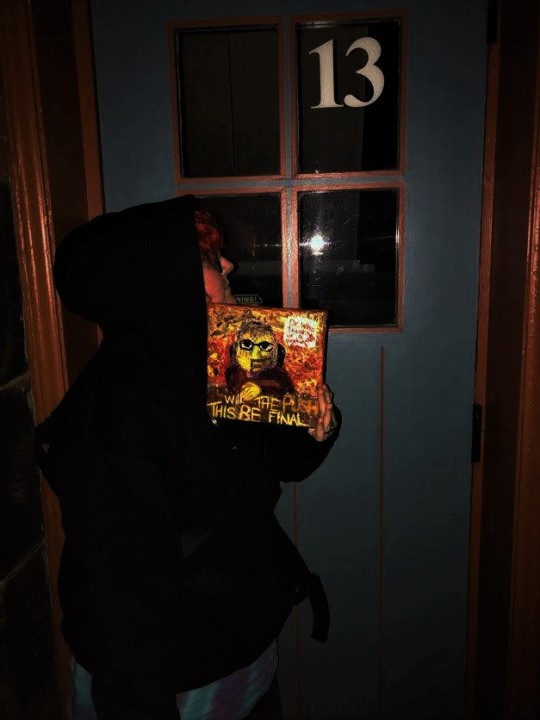

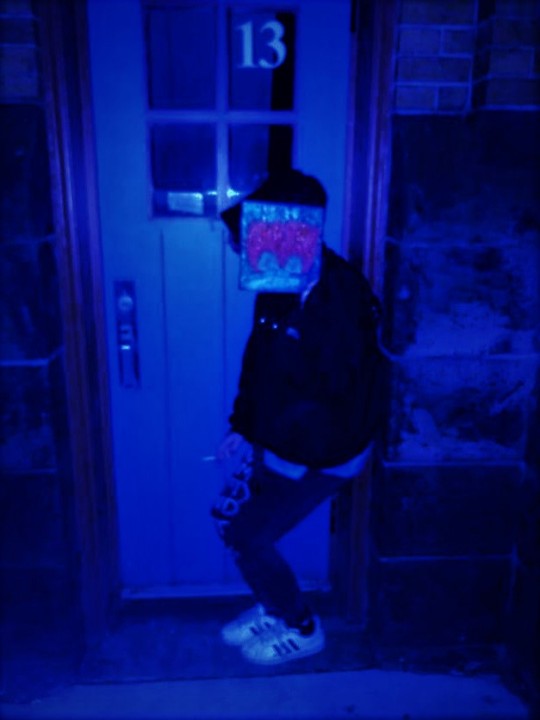




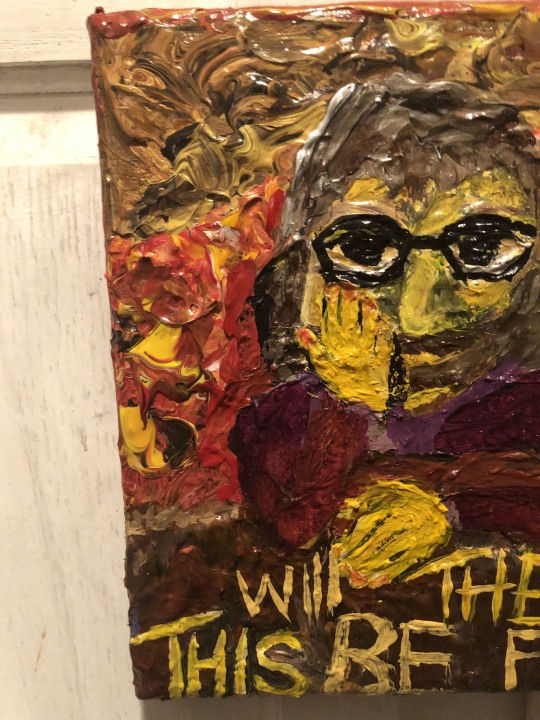
EXPOSED: Living with OCD through Art (HOW DO I LOVE?) | #OCDArtist #IOCDF #ARTSAVEDMYLIFE | These four paintings began in my Exposure and Response Prevention intensive outpatient program this past July. It took mornings of facing fears I've been ritualizing away my whole life to get to this point, to these paintings. No profession guarantees success, really. Nothing can do that for us, except for us. My dreams, the creative ones, have always been possible. There is no complete dream, though, and I think I'm finally start to live in mine. IRL, tho. My whole life adults have been telling me that when they look at my dreams they just see a hat, meanwhile I moved on, shaking my head because it is just like The Little Prince. We forget. We don't see the snake swallowing the elephant in the room whole, and when we lose that part of ourselves to the lives our adult parents and caregivers who view vulnerability as weakness and creativity as frivolous, we lose who we are meant to become. Our most authentic selves. OCD has me doubting myself every step of the way, so I am finally deciding to fucking side step that shit and live every minute of the life that I am choosing to lead. Not my mom. Not my OCD. Not my trauma. Me. Do your healing and see how you become the person you really, truly did need. It's fucking wild. I couldn't have done it without embracing the artist I was always meant to become. Deepest gratitude to my therapists, psychiatrists (who fucking listened to me), and my husband and favorite human. Also all the love to my cat boys who spend nights sitting up with me while I paint. Recovery from things, OCD or addiction or any other illness that exists, never stops. For me, my 12-step program is ERP. My OCD is lifelong. So I can't stop, and that means I can't stop painting. What a beautiful way to show the ones you love that you love them by waking up every day to face your fears and become the mindful being they, and you, deserve. #artistsoninstagram #artoftheday #exposureresponseprevention #ERP #OCDrecovery #IOCDF #IOCDFARTISTS #OctoberArt #supportdisabledartists👻
IF YOU LIFE WHAT I PAINT/WRITE, SUPPORT ME ON CASHAPP: $sfigart
#ocd brain#ocd art#artists on tumblr#painting#inspiration#museums#Exposure response prevention#ERP#OCD recovery#ocd journey#NOCD#IOCDF#halloween#october art#spooky church door#spooky church#october#my birthday is on halloween#pay me money#cashapp me bro
24 notes
·
View notes